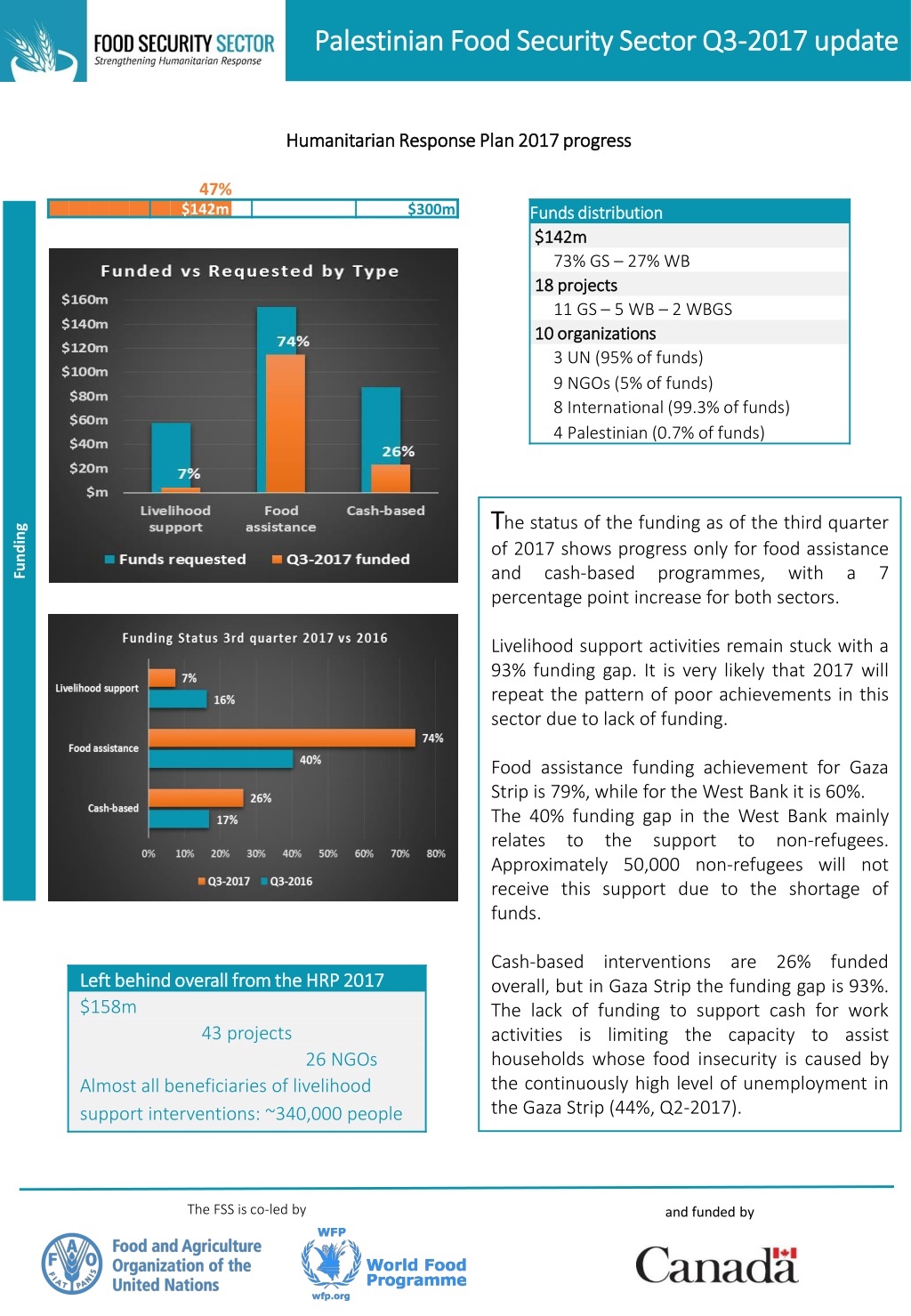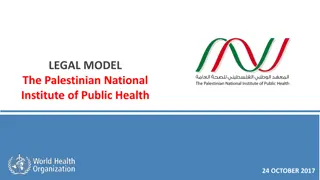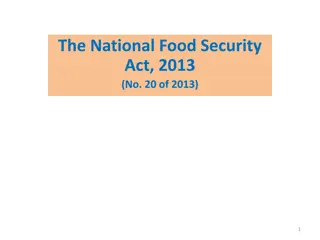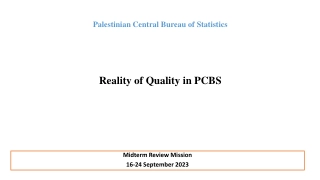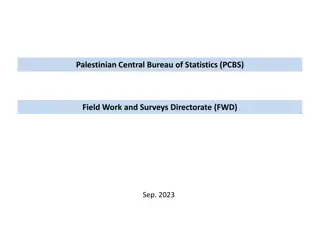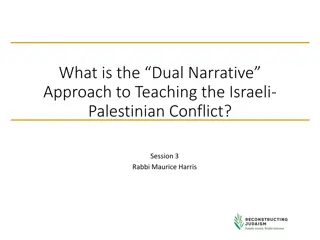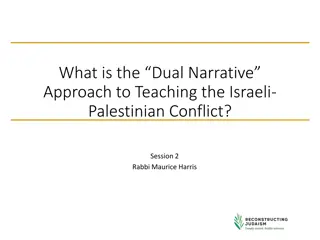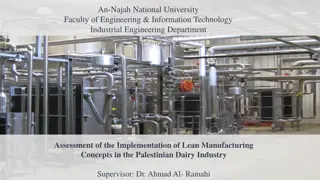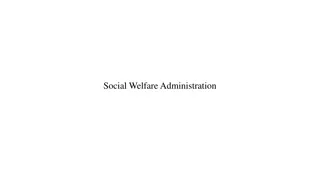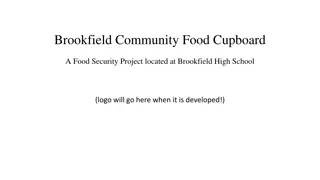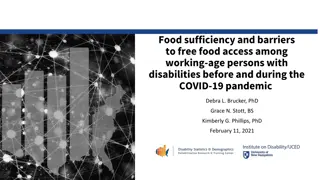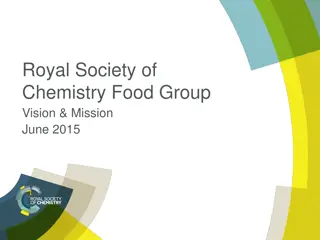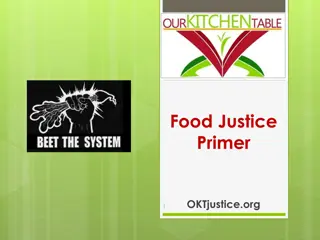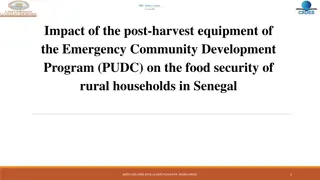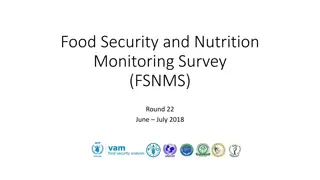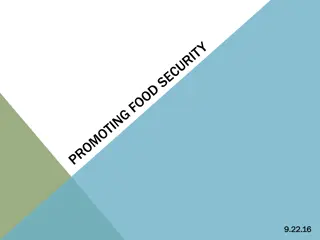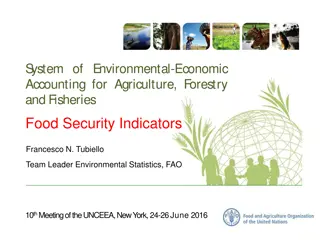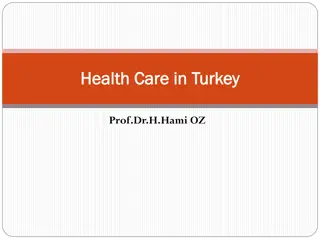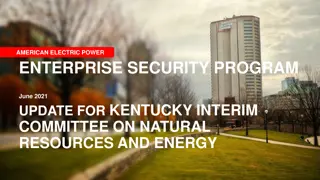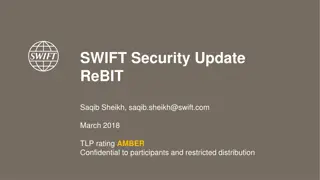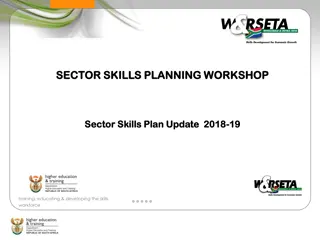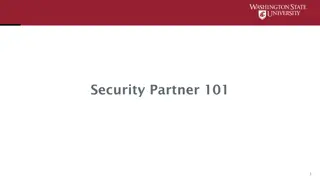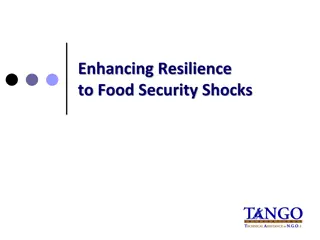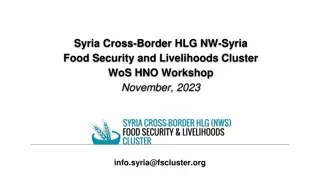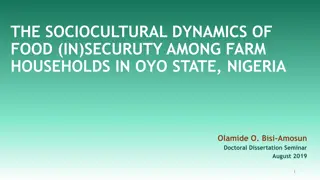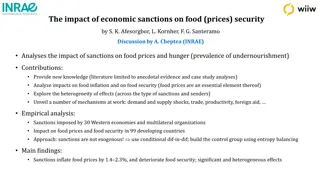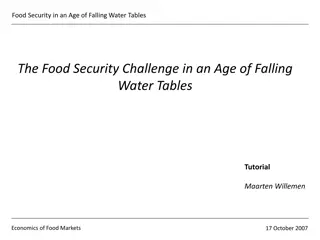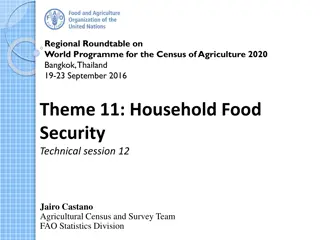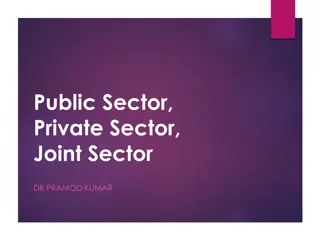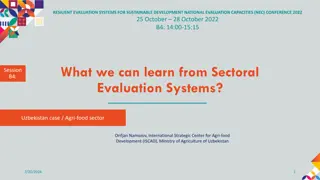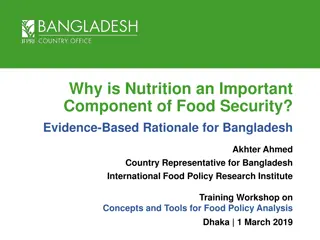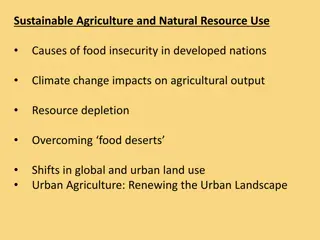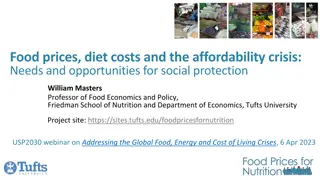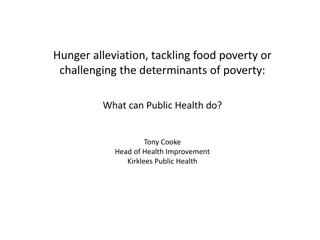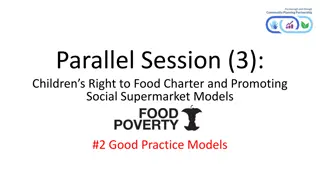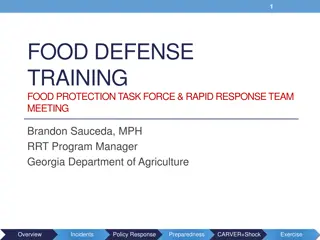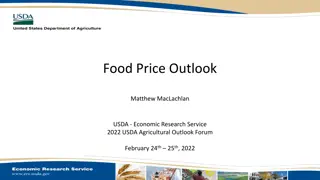Palestinian Food Security Sector Update Q3 2017
The Palestinian food security sector in Q3 2017 shows progress in funding distribution, with a 47% achievement of the $300m Humanitarian Response Plan. Challenges remain in livelihood support activities. The project aims to address these gaps and reach more beneficiaries in the West Bank and Gaza Strip.
Download Presentation

Please find below an Image/Link to download the presentation.
The content on the website is provided AS IS for your information and personal use only. It may not be sold, licensed, or shared on other websites without obtaining consent from the author. Download presentation by click this link. If you encounter any issues during the download, it is possible that the publisher has removed the file from their server.
E N D
Presentation Transcript
Palestinian Food Security Sector Q3 Palestinian Food Security Sector Q3- -2017 update 2017 update Humanitarian Response Plan 2017 progress Humanitarian Response Plan 2017 progress 47% $142m $300m Funds distribution Funds distribution $142m $142m 73% GS 27% WB 18 projects 18 projects 11 GS 5 WB 2 WBGS 10 organizations 10 organizations 3 UN (95% of funds) 9 NGOs (5% of funds) 8 International (99.3% of funds) 4 Palestinian (0.7% of funds) T The status of the funding as of the third quarter of 2017 shows progress only for food assistance and cash-based programmes, with a 7 percentage point increase for both sectors. Funding Livelihood support activities remain stuck with a 93% funding gap. It is very likely that 2017 will repeat the pattern of poor achievements in this sector due to lack of funding. Food assistance funding achievement for Gaza Strip is 79%, while for the West Bank it is 60%. The 40% funding gap in the West Bank mainly relates to the support to non-refugees. Approximately 50,000 non-refugees will not receive this support due to the shortage of funds. Cash-based interventions are 26% funded overall, but in Gaza Strip the funding gap is 93%. The lack of funding to support cash for work activities is limiting the capacity to assist households whose food insecurity is caused by the continuously high level of unemployment in the Gaza Strip (44%, Q2-2017). Left behind overall from the HRP 2017 Left behind overall from the HRP 2017 $158m 43 projects 26 NGOs Almost all beneficiaries of livelihood support interventions: ~340,000 people The FSS is co-led by and funded by
Humanitarian Program Cycle Humanitarian Program Cycle HPC HPC- - 2018 2018 The Humanitarian Programme Cycle (HPC) refers to a series of actions undertaken in the management of international humanitarian response operations. conducted, to the extent possible, in collaboration with and in support of national and local authorities. than organizations participated in these two workshops. 100 attendees representing 45 These must be The HPC is usually a year-round cycle. Two components of the HPC are the definition of the needs through the Humanitarian Needs Overview (HNO), and the elaboration of the plan to address the identified needs through the Humanitarian Response Plan (HRP). Palestinian Food Security Sector Q3-2017 update A Multi-Year Humanitarian Response Plan (MYHRP) is a tool for planning and coordinating the delivery of humanitarian aid in protracted crises over several years. It differs from a traditional HRP in its focus on establishing a longer-term response strategy. A MYHRP can facilitate a more effective humanitarian response, with protection at its core, aiming at a more predictable and realistic/appropriate arrangements, and a greater focus on the sustainability of results. For the year 2018, in oPt a MYHRP is being implemented. Following these workshops, the FSS team organized a second round of workshops in September, in order to articulate priorities of the response, defining most relevant activities and elaborating FSS indicators. For the HRP 2018, the FSS team in cooperation with line ministries, designed a new coordination mechanism, with the intention of harmonizing partners response plan with assessed duplications. operational needs, avoiding The coordination mechanism was presented during the workshops: partners interested to contribute to the HRP, communicated their draft plan in advance, in order to make an initial mapping of the response. In parallel, the FSS team worked with line ministries staff in order to elaborate lists of quantitative needs for both West Bank and Gaza Strip, at governorate level. This included basic assets and vulnerable groups that will be targeted by most of the FSS partners under the HPC 2018. In this quarter, the FSS coordination team kicked off the process to start preparations for the HPC 2018. 20 partners expressed their intention to participate in the HRP 2018 in West Bank, and 30 in Gaza Strip. The exchange of information generated by the coordination mechanism, triggered a series of initiatives among FSS partners that resulted the adaptation of plans and a redefinition of intervention areas. In August, FSS partners started preparations for the HPC 2018. During August the FSS coordination team called for dedicated workshops in both West Bank and Gaza Strip in order to facilitate the making of the HNO, and drafting priorities of the response. More
Information management Information management The FSS team continued efforts to finalize the information system accessible to all FSS partners. The work focused mainly on analysing the features already existing in the MoA software, as well as elaborating the information flow for the new system. By end of this quarter, the MoA team was provided with the preliminary version of the system in order to test it and provide their feedback and comments. Resilience Marker (RM) Resilience Marker (RM) Palestinian Food Security Sector Q3-2017 update During this quarter, the Review Committee provided a series of recommendations that will be incorporated into the Resilience Marker (RM) tools. It was clarified that the RM, in its current design, will not be used as part of the vetting criteria for the HRP projects due to the significant efforts required, which cannot fit within the tight HRP schedule. In addition, the time allocated to some process phases should be adjusted, to better reflect the real effort required. The Review Committee endorsed the RM tool. The next steps will focus on applying the RM to the HRP 2018 projects, under the FSS. SEFSec survey SEFSec survey The FSS team initiated contact with relevant parties, for the preparation of the SEFSec survey 2018. In contrast to previous editions, the next SEFSec survey will source part of the required funds outside the FSS and UN Agencies budget, as the data collection will be carried out thanks to funds from the Netherlands Representative Office channeled though a project implemented by the Palestinian NGO UAWC. PCBS will remain as the agency in charge of data collection, and the FSS will continue to facilitate the overall process. Initial meetings took place in July, in order to introduce new parties, and start preparation on the overall work plan.
Major events Major events 3 FSS general meetings in both WB and GS 5 ICCG meeting in both WB and GS Field visits with partners 3 HPC workshops under the FSS preparation for the HPC-2018 process 1 Ad-hoc ICCG meeting to specifically discuss the electricity crisis and impact. Emergency meeting with the HC and ICCG in Gaza on the impact of energy crisis. Inter-cluster meetings on HPF allocation. Cash programing working group meeting. Assessment and Information working group at ICCG level meeting. Resilience marker panel review-2nd session. Palestinian Food Security Sector Q3-2017 update Humanitarian Fund Humanitarian Fund The oPt Humanitarian Fund (HF) standard allocation granted $1.25m for FSS projects, to enable the rehabilitation of 4 water wells; to install 18,000 meters of water carrier lines; to plant 1,110 dunums of open field lands with different types of seasonal vegetables; and to rehabilitate 10 kilometres of roads (only in the West Bank). During the third quarter, the implementing partners in both West Bank and Gaza Strip completed the preparation phase of the project including staffing arrangements, selection and verification of beneficiaries with the Ministry of Agriculture, as well as tendering, contracting and procurement processes. It is planned that work on the ground will start by the coming quarter. Gaza Strip Reserve allocation Gaza Strip Reserve allocation Field visits have been conducted by FSS team and HF staff in both Gaza Strip and West Bank for the HF 1st Allocation 2017. Follow up activities and the implementation progress was conducted during the field visits. The HF Strategic Review Committees met, analysed and vetted all projects. Under the FSS, proposals submitted by NDC, RWDS PUI and Mercy Corps were selected as the top four projects, based on the pre-defined criteria and through the scoring process. monitoring of Due to the emerging energy crisis, the oPt Humanitarian Fund (HF) management called for the Gaza Reserve Allocation 2017 in this quarter with a total of $5.3 million. Three most affected clusters/sectors were involved in this allocation, Health, WASH and FSS. Eligible projects were selected according to the allocation paper criteria. Efforts were taken with FSS partners to check the validity criteria for submission, and the in-depth elaboration of the call. 12 projects were submitted and reviewed during a first round of the FSS technical committee, facilitated by the FSS team.
From WFP Over the third quarter of the year, WFP assisted 473,000 food insecure non-refugees in Gaza and the West Bank, through both cash-based transfers (CBT) - using an electronic card redeemable in local shops - and in-kind food assistance. Women and children accounted for 70 percent of those assisted. WFP food assistance was critical in meeting their immediate stabilizing their dietary diversity, protecting their livelihoods and devastating and accumulative impact of decades of conflict on their socio-economic status. Thanks to donor support (United States, Switzerland, Spain, France, private sector companies), WFP s voucher funding requirements under the United Nations Gaza emergency appeal (USD 4 million) covering the period July-September were secured. It enabled WFP, through its network of 87 contracted shops, to provide continued assistance to 92,000 people in all Gaza governorates. Food assistance has been critical in the current Gaza context where the power shortages of up to 20 hours per day continue to seriously undermine the dire living conditions and further stretch the coping mechanisms of the poorest, including WFP beneficiaries who live in deep poverty with less than USD 3.2 per day. WFP, together with other United Nations agencies, also provided emergency assistance to vulnerable Bedouin communities living in area C of the West Bank whose houses have been demolished. In July, August and September, WFP provided emergency voucher assistance to 62 people for a total of USD 1,100, following OCHA s recommendations and WFP s assessments. Since the beginning of the year, WFP assisted 258 people with emergency vouchers for a total value of USD 4,300. food needs, Palestinian Food Security Sector Q2-2017 update mitigating the Photo: WFP/Asma` Nassar. A Gazan family recipient of WFP`s food assistance upon redeeming their electronic voucher at a neighbouring shop in Jabalia
From FAO In the third quarter of 2017, FAO continued to enhance resilience and support livelihoods of farmers and herders throughout the West Bank and Gaza Strip. The distribution of immediate relief to 1 380 households benefitting approximately 8 000 people was completed between July and August among vulnerable 46 Bedouin and herder communities in Area C of the West Bank. The emergency in-kind support of animal feed and poultry units helped vulnerable communities to maintain their livelihoods and avoid negative coping strategies. This emergency assistance was delivered under a Humanitarian Pooled Fund project. enables them to irrigate their farm land and strengthens their resilience. This programme is supported by the Government of Brazil. In September 2017, Palestine achieved a major milestone with the approval of the first ever National Food Safety Strategy (2017- 2022) by the Cabinet. The strategy was developed with technical support from FAO thanks to the contributions of the Governments of Netherlands and Switzerland. The strategy provides clear guidance for coordinated, multi-sectoral actions to ensure food safety for Palestinian people for the next five years. Palestinian Food Security Sector Q3-2017 update The strategy commits to modernizing food safety laws, regulations, standards and enforcement, strengthening food control systems, developing national capacity in risk analysis and control and prevention of foodborne diseases. The strategy aligns with international standards and alert systems such as the joint FAO-WHO Codex Alimentarius on international food standards and the International Food Safety Authorities Network (INFOSAN). Photo: FAO/Amro Kalouti. Bedouin herders receive animal feed in Area C. FAO is providing emergency agricultural support to protect the food and nutrition security of 123 low resilience households in the Gaza Strip, benefiting over 730 individuals. Targeted households are receiving assistance to encourage the production, consumption and sale of nutritious foods in local markets. The establishment of livestock and vegetable units is due to be completed in Q4 2017. With support from this programme, 53 small farms in North Gaza benefited from the successful connection of the agricultural water well to the electricity grid which Photo: FAO/Marco Longari. Food safety practices should be followed at all stages of food production and preparation: from farm to fork. Lead agencies FAO and WFP FSS coordinators Ciro Fiorillo ciro.fiorillo@fao.org ; Daniela Owen daniela.owen@wfp.org Marco Ferloni marco.ferloni@fscluster.org +972 (0) 546773171 Hosne Barakat hosne.barakat@fscluster.org + 972 (0) 546773161 Anas Musallam anas.musallam@fscluster.org +972 (0) 592030026 http://fscluster.org/state of palestine
